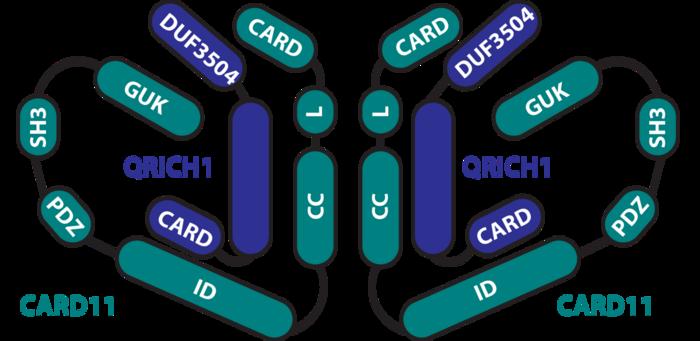In groundbreaking research, scientists at Johns Hopkins Medicine have unveiled a fascinating new role for the protein QRICH1, highlighting its potential implications for the treatment of cancer and autoimmune diseases. By fine-tuning the activation of T cell receptors, QRICH1 could serve as a novel target for therapeutic drugs designed to modulate the immune response, thereby enhancing the fight against cancerous cells and regulating the immune system’s overzealous reactions in autoimmune disorders.
The study, conducted on the immune systems of genetically modified mice, offers fresh insights into the complex signaling pathways that govern T cell activation. QRICH1 has been identified as a crucial component in the signaling pathway of CD8+ T cells, which play a significant role in the immune response by identifying and destroying infected or cancerous cells. The researchers discovered that QRICH1 functions as a partial brake within this system, meaning that its regulation could lead to innovative strategies for both enhancing immune responses against cancer and inhibiting excessive T cell activity in autoimmune diseases.
Immunotherapy has emerged as a powerful tool in the treatment of various cancers. By harnessing the body’s natural immune system, these treatments can expedite the death of tumor cells or suppress autoimmune responses that damage healthy tissue. The quest for new drug targets like QRICH1 is therefore a critical avenue of research aimed at making immunotherapy safer and more effective for patients suffering from these serious conditions.
According to Joel Pomerantz, Ph.D., senior author of the study and associate professor at Johns Hopkins University School of Medicine, the discovery of QRICH1 as a modulator for T cell activation opens up exciting possibilities for drug development. The researchers are optimistic that by targeting this protein, they can enhance the efficacy of immunotherapies and develop new treatments that better manage immune-related diseases.
To investigate the role of QRICH1 in T cell signaling, the team genetically engineered mice to lack this particular protein. Their experiments demonstrated the indispensable role of QRICH1 in facilitating T cell signaling, as T cells extracted from these QRICH1-deficient mice displayed heightened activity in response to signals mimicking cancerous or infected cells. The increased T cell activity observed correlates with QRICH1’s role as a regulatory element that tempers T cell activation, suggesting that pharmaceutical interventions could be designed to manipulate QRICH1’s functioning.
The implications of this research extend beyond theoretical applications. In the context of various cancers, QRICH1 could be strategically targeted to boost T cell activation, thereby improving responses against malignant cells. Conversely, in cases where T cells are overactive—such as in autoimmune diseases and certain blood cancers like leukemia and lymphoma—QRICH1’s inhibitory role could provide a means to downregulate T cell activity and alleviate disease progression.
Further investigations revealed that mice lacking QRICH1 exhibited a significantly stronger immune response when exposed to listeria monocytogenes, a bacterium responsible for foodborne infections. This natural infection model indicates that T cells can be overly activated in the absence of QRICH1, demonstrating its vital function as a regulatory protein in immune responses. Such findings are crucial in understanding how the immune system can be manipulated for therapeutic benefits.
Moving forward, the researchers plan to explore how T cells engineered without QRICH1 respond to cancerous cells, intending to unravel the intricate mechanisms of immune regulation and cellular communication in the context of malignancies. This avenue of research promises to yield valuable insights into the potential for QRICH1-targeted therapies to elevate the immune system’s effectiveness in combatting cancer.
This pioneering study has been supported by funding from the National Institutes of Health and represents a significant step forward in the search for new cancer treatments. It highlights the importance of understanding molecular interactions in the immune system and their potential to be translated into clinical applications that transform patient outcomes.
By delineating the role of QRICH1 in regulating T cell activation, this research paves the way for further investigation into the mechanistic underpinnings of immune responses. As scientists uncover the complexities of immune signaling, they move closer to designing targeted therapies that leverage the body’s inherent defenses against disease.
QRICH1 stands out not only for its biological significance but also for its therapeutic potential. As researchers work to identify and engineer drugs that can modulate this protein’s activity, they are poised to create innovative treatments that harness the power of immunotherapy with increased specificity and reduced risk.
In conclusion, the discovery of QRICH1’s role in T cell receptor signaling presents an exciting opportunity for advancing immunotherapy. This research exemplifies the vital intersection between fundamental science and clinical application, foreshadowing a future where precision medicine can fine-tune immune responses to better treat cancer and autoimmune diseases.
With ongoing studies and the promise of QRICH1-targeted therapeutics, the scientific community remains hopeful about the possibilities of reshaping how diseases are treated, driven by an understanding of the intricate biology of immune system regulation. As the field evolves, the potential for QRICH1 in therapeutic applications could lead to breakthroughs that change the landscape of treatment for millions of patients worldwide.
Subject of Research: The Role of QRICH1 in T Cell Activation and Potential Applications in Immunotherapy
Article Title: New Insights into QRICH1: A Key Regulator of T Cell Activation with Therapeutic Implications
News Publication Date: March 14, 2023
Web References: Science Immunology
References: National Institutes of Health (RO1AI43053, F31CA254167 and T32GM007445)
Image Credits: Nicole M. Carter
Keywords: QRICH1, T cell activation, immunotherapy, cancer treatment, autoimmune diseases, immune regulation, signaling pathways, CD8+ T cells, drug development




